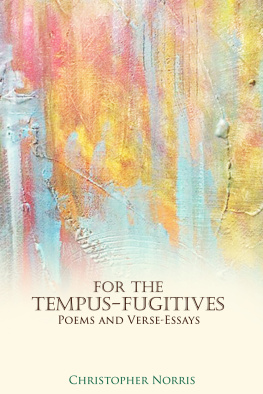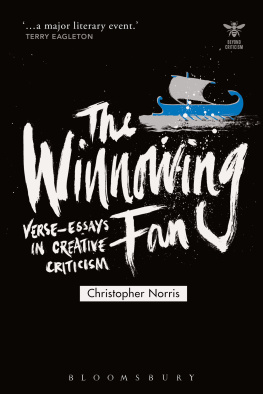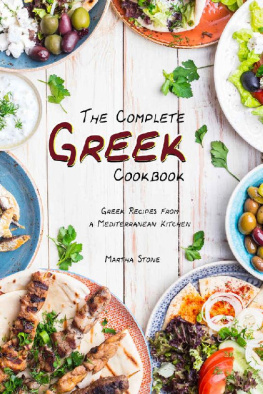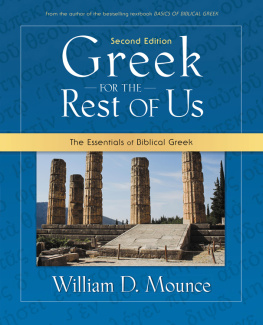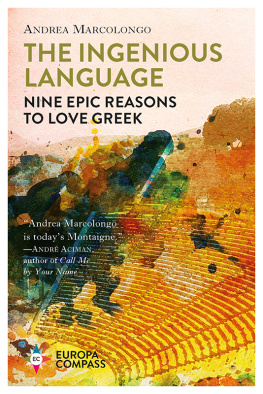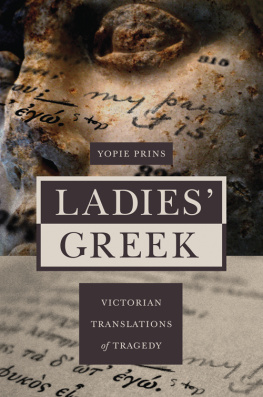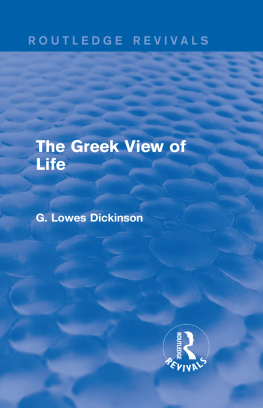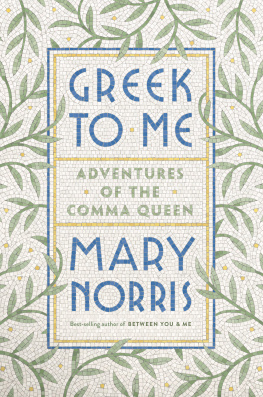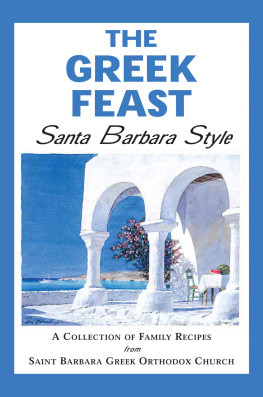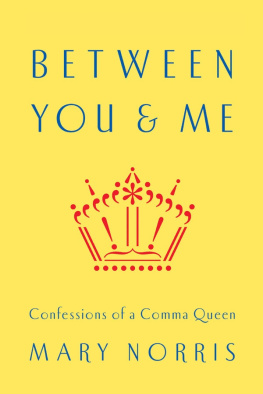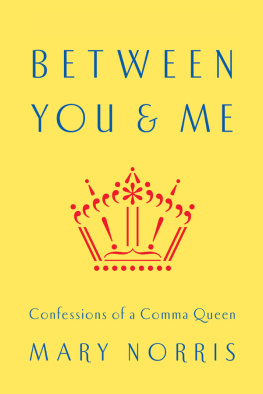Contents
Guide

ALSO BY MARY NORRIS
Between You & Me: Confessions of a Comma Queen
GREEK TO ME
Adventures of the Comma Queen
MARY NORRIS

Copyright 2019 by Mary Norris
All rights reserved
First Edition
For information about permission to reproduce selections from this book, write to Permissions, W. W. Norton & Company, Inc., 500 Fifth Avenue, New York, NY 10110
For information about special discounts for bulk purchases, please contact W. W. Norton Special Sales at specialsales@wwnorton.com or 800-233-4830
Book design by Ellen Cipriano
Production manager: Anna Oler
The Library of Congress has cataloged the printed edition as follows:
Names: Norris, Mary 1952 author.
Title: Greek to me : adventures of the comma queen / Mary Norris.
Description: First edition. | New York : W. W. Norton & Company, 2019.
Identifiers: LCCN 2018050108 | ISBN 9781324001270 (hardcover)
Subjects: LCSH: Norris, Mary 1952 TravelGreece. | Periodical editorsUnited StatesBiography. | AmericansGreeceBiography. | GreeceDescription and travel. | Greek languageSocial aspects.
Classification: LCC PN4874.N638 A3 2019 | DDC 306.442/81dc23
LC record available at https://lccn.loc.gov/2018050108
ISBN 9781324001287 (ebook)
W. W. Norton & Company, Inc., 500 Fifth Avenue, New York, N.Y. 10110
www.wwnorton.com
W. W. Norton & Company Ltd., 15 Carlisle Street, London W1D 3BS
For Miles and Dee
and in memory of our parents,
Miles and Eileen Norris.
It is ever to be borne in mind that though the outside of human life changes much, the inside changes little, and the lesson-book we cannot graduate from is human experience.
EDITH HAMILTON,
THE GREEK WAY
C ONTENTS
GREEK TO ME
S ING IN ME, O Muse, of all things Greek that excite the imagination and delight the senses and magnify the lives of mortals, things that have survived three thousand years and more, since the time before the time of Homer, things that were old then and are new nowyou know, the eternal. If thats not too much to ask, Muse. Please?
I dont know what gave me the idea I was good at foreign languages. I was an indifferent student of French in high school, though I longed to study at the Sorbonne instead of on the banks of the Cuyahoga. When I was in about fifth grade, my father refused to let me study Latin. The nuns had handpicked some students for a Saturday Latin class, and I was keen on it, but Dad flatly refused. My father was a pragmatic man. He worked for the fire departmentone day on and two days offand he could do anything around the house: roofing, plumbing, carpentry, laying linoleum. He grew up during the Depression, when jobs were scarce, so for him security was paramount.
When I asked Dad to let me study Latin, he stamped out that flame like a pro in his firemans boots. Was Dad against education for women? Yes. Was he worried I would come too much under the spell of the nuns and join the convent instead of getting married and settling down in the neighborhood? Probably. Had he missed the story of how the father of John Milton, recognizing the lads genius, had him tutored in Latin and Greek from earliest youth? Apparently. Had he been scarred by a dead language? Yes! As a teenager, my father, who had been kicked out of three high schools, was sent by my grandmother to Ontario, Canada, to stay with his uncle, who had been educated as a Jesuit seminarian but backed out just before taking his final vowswent over the wall, as they sayand returned to Ontario to farm pigs. Uncle Jim taught my father a few things, and my father passed them on to us at the dinner table, such as the proper way to feed a horse an apple (with the palm flat) and the myth of Sisyphus, whose eternal punishment was to roll a boulder up a mountain and have it always roll back down, so he had to start over again. It sounded like a particularly bleak life lesson. What activity might merit a statuette in the shape of Sisyphus? Renewed effort in the face of certain failure? Undying hope? Persistence in ordinary life? Anyway, my father associated the classics with punishment, the eternal damnation of Sisyphus in Tartarus or the temporary banishment of a juve nile delinquent to the remote home of his maternal ancestors in rural Ontario. So when the nuns invited me to study Latin on Saturdays, Dad said, No way, and I missed that first chance to learn Latin while my brain was at its most absorbent.
In college, I continued with French for a year and then dropped it. My junior year, I took a course in linguistics and had a flare-up of lust for Latin. I would soon graduate and have to decide what to do next, and I had just figured out that four years of a liberal-arts education was a delightful absurdity, a legitimate escape from real life, from Richard Nixon and the Vietnam War, a deferral of career and responsibility. I would study Latin, a dead language, for the sheer impracticality of it. I would know the joy of being a total nerd. But my linguistics professor, Whitney Bolton, talked me out of it. Latin, he said, would serve only to teach me about English. I didnt think to ask what was wrong with that. Remember, many linguists believe we are born hardwired to acquire language: I didnt need Latin to know English. Professor Bolton, whom I likedhe had a round head and a buzz cut, and reminded me of Anthony Hopkins as Richard the Lionheart in The Lion in Winter told me I would be better off studying a living language, one that I could use in my travels. How did he know I wanted to travel? And Latin was spoken only in the Vatican. So I scratched that itch by taking a year of German. Ive traveled a lot since then, but not in Germany, where Oktoberfest would no doubt have untied my tongue. Meanwhile, German did teach me a lot about English.
My taste for dead languages lay dormant until circa 1982 AD, at which point I had been working at The New Yorker for about four years, doing my best to master the Major Arcana of New Yorker style for a job on the copydesk. I had worked my way up to the collating department, where I basically got to see what everyone else did and study various editorial biases and skills. Collating, which has long since been replaced by the word processor, might be described as the liver of The New Yorker s editorial process. Proofs arrived from a pieces editor, the author, the editor-in-chief (then William Shawn), Eleanor Gould ( The New Yorker s famous grammarian), proofreaders, fact checkers, and the libel lawyer, and we collators copied the changes the editor had accepted onto a clean proof for the printer, filtering out the dross, and sent the collated proof via fax (state of the art at the time) to the printer. Overnight, a revision appeared. The big excitement was being able to flag a mistake and save embarrassment. Once, coming back from lunch, I found the editor Gardner Botsford at my desk, taking refuge from a demanding author, who was just then on her way down the hall, calling, Gardner?
One weekend, I saw Time Bandits in a theater on the Upper East Side. In the film, directed by Terry Gilliam, of Monty Pythons Flying Circus, and starring John Cleese and Michael Palin, a band of time-traveling dwarves plunder treasure from the past. One scene, set in ancient Greece, featured Sean Connery in a cameo as Agamemnon. He was dueling with a warrior who wore the head of a bull and looked like the Minotaur. The landscape was so stark and arid, and so enhanced by the mighty figure of Sean Connery in armor, that I wanted to go there right away. It didnt matter that the Minotaur was from Cretehis labyrinth was at Knossos, near Heraklionand that Agamemnon was famously from the Peloponnese: he and his brother Menelaus were sons of Atreus, who was the son of Pelops, for whom the peninsula was named. The glory of Sean Connery blinded me to the screenwriters twist on mythology. I was also unaware that the scenes set in Greece had been shot in Morocco.

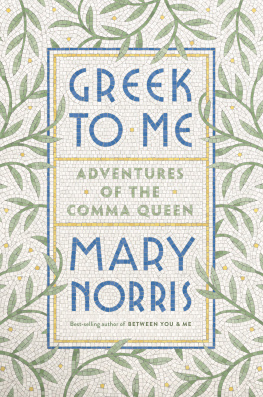

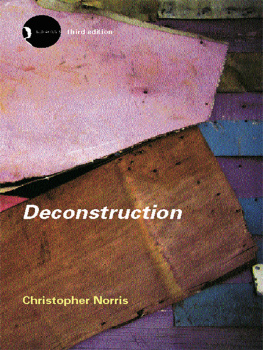
![Norris - Clybourne Park: [a play]](/uploads/posts/book/223649/thumbs/norris-clybourne-park-a-play.jpg)
